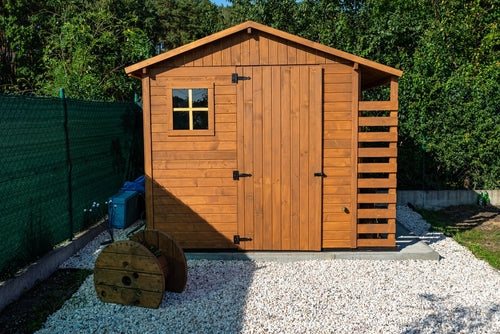
Effective Ways to Heat Your Shed Without Electricity
Sitting in your shed during the cold winter months can be off-putting. While it’s possible to hook up electricity to your shed, this option may not be available for everyone.
Keeping your garden shed warm and cosy without relying on electricity might seem like a challenge, but it’s easier than you think!
Today, Atlas Sheds will discuss practical, eco-friendly ways to heat your shed without relying on the grid. From clever insulation tips to ingenious off-grid heating solutions, we've got everything you need to keep the chill at bay.
1. Use a Wood-Burning Stove
Wood-burning stoves are an excellent option for those who wish to create a cosy and welcoming ambience in their shed.
Their compact design, high heat output, and efficiency will keep your shed warm throughout the winter. All they require is burning wooden logs to generate heat.
When installing a wood burner, keep it on a heat-resistant mat and away from flammable materials.
2. Insulate Your Shed Properly
Proper insulation is necessary for any shed you wish to spend a lot of time in.
This helps retain heat generated from any source, whether it’s a wood-burning stove, solar heat, or even body warmth, making your shed easier to heat and maintain at a comfortable temperature.
Insulate walls, floors, and ceilings as follows:
- Walls: Place insulation boards or foam panels inside the walls.
- Floors: Place foam boards or wool rolls underneath the floorboards.
- Roof: Use fibreglass or foil-backed foam for insulation.
- Doors and windows: Use draught excluders, weather stripping, or rubber seals to eliminate gaps around doors and windows.
3. Harness Solar Power
Passive solar heating relies solely on strategic placement, insulation, and specific building materials to capture and radiate warmth.
Place your shed facing south to receive the most sunlight during the day. Opt for double-glazed windows to trap heat inside and use thermal mass materials, such as concrete, stone, and brick, for the construction of your shed.
Insulate your shed with the steps above and place solar heat collectors on the roof of your shed to capture solar energy and convert it into heat.
4. Utilise a Propane Heater
Propane heaters are powered by propane gas, making them a convenient off-grid solution for heating your shed.
A compact portable heater should suffice for small to medium-sized sheds. Larger sheds or those with less insulation may benefit from a more powerful wall-mounted model.
When setting up a propane heater, place it on a stable, non-flammable surface away from walls, furniture, or any combustible materials.
5. Use Rugs and Thermal Curtains
Heating doesn’t have to be so complicated.
Simple additions such as thick rugs and thermal curtains can help you contain heat inside your shed. You can also add carpet to your shed to prevent drafts from getting in from underneath doors.
Opt for thicker, heavy-duty rugs made of materials like wool or synthetic fibers designed for outdoor use. Thermal curtains with a dense weave and heavyweight material will suffice. Use them alongside heavy drapes for added insulation.
6. Candle Heaters or Oil Lamps
Another easy and affordable option for heating a shed without power is to use oil lamps and candle heaters.
Due to their portability, these are ideal for small sheds or anyone looking for a flexible, temporary heating option. Plus, they only require lighting a candle or wick for setup.
This is perfect for creating a cosy ambience during the winter months.
Eco-friendly Garden Solutions
With these effective, electricity-free heating solutions, your shed can stay warm and comfortable year-round.
At Atlas Sheds, we offer a wide range of high-quality, durable sheds that are perfect for all seasons. Whether you're looking to upgrade your current space or invest in a new garden building, we've got you covered.